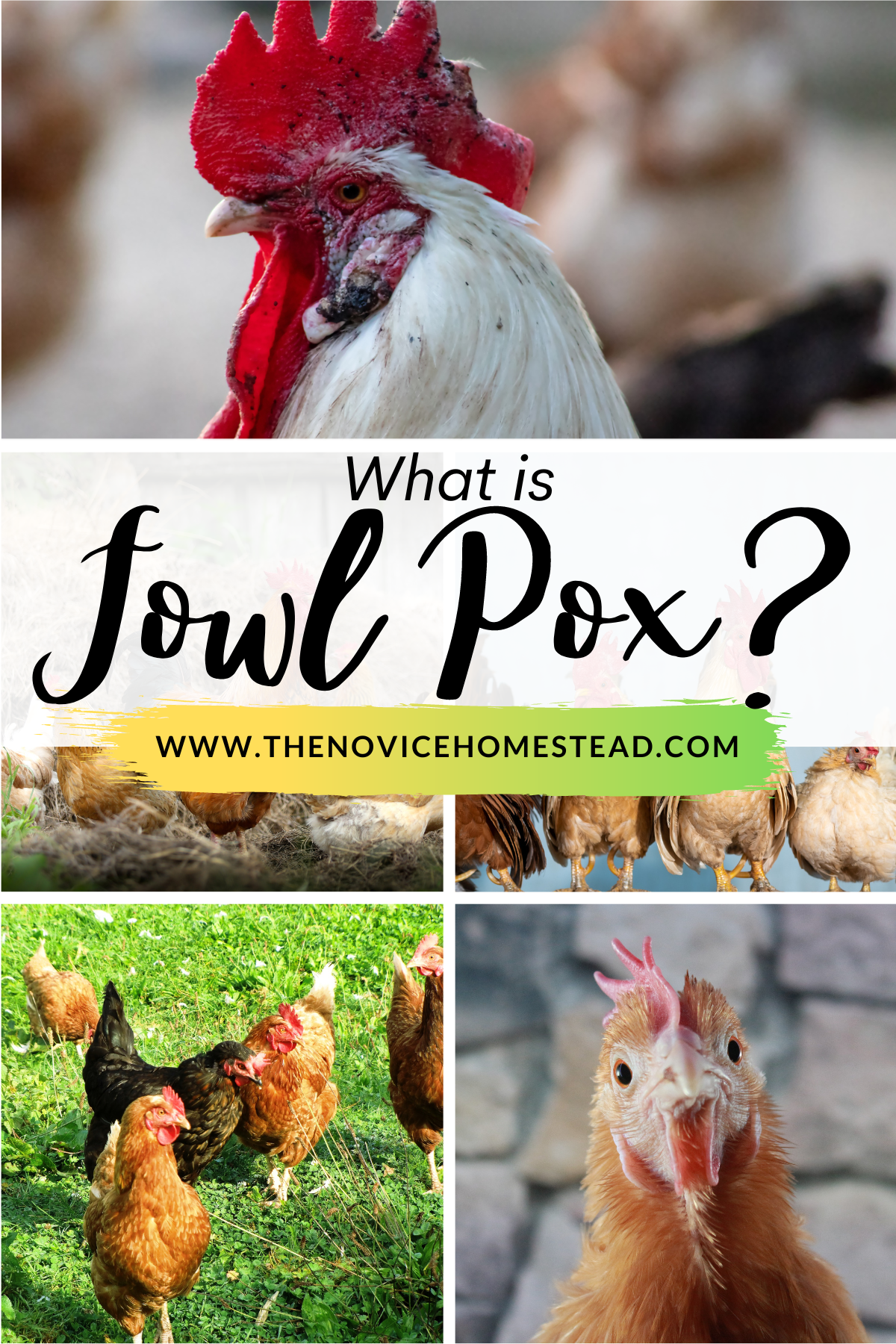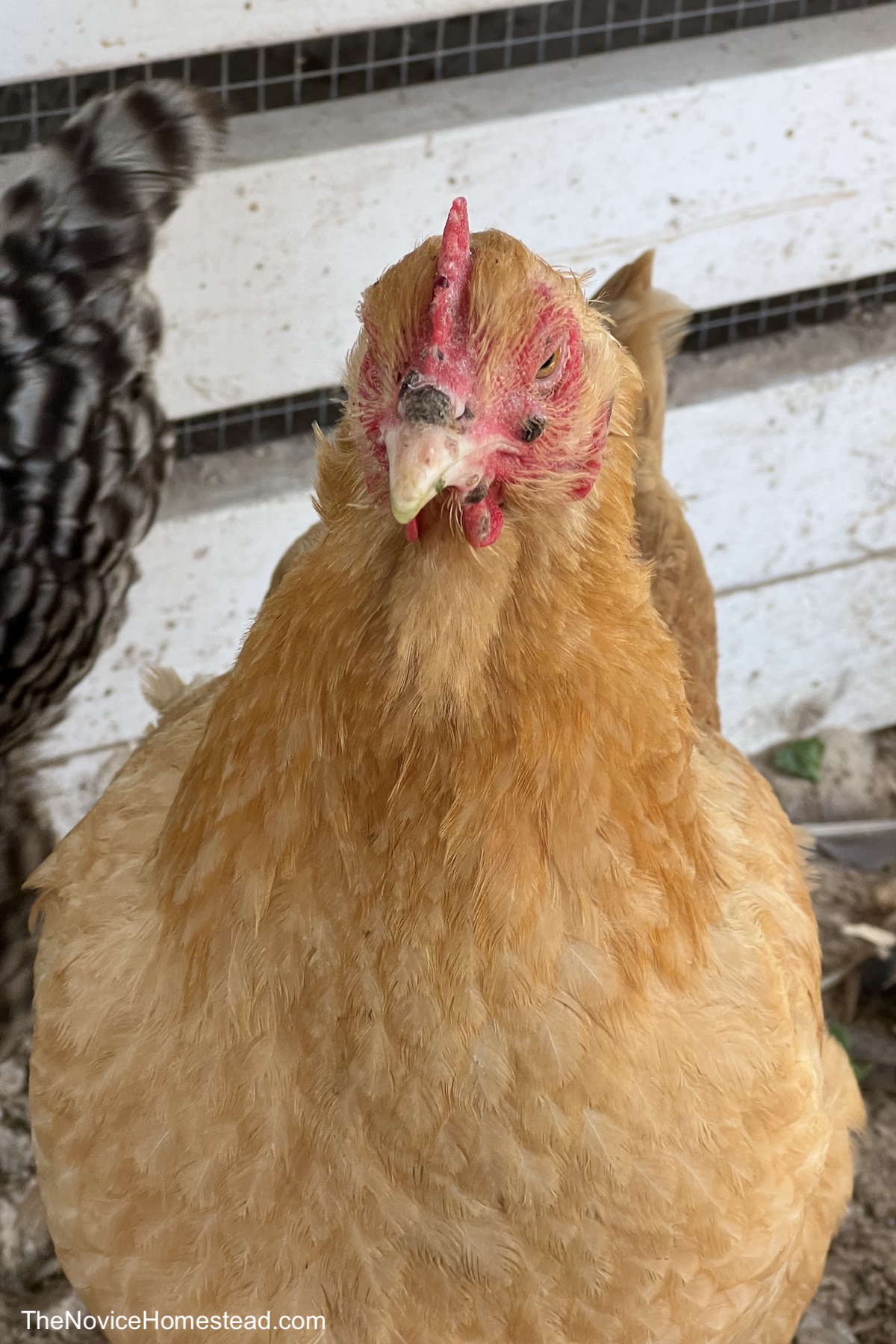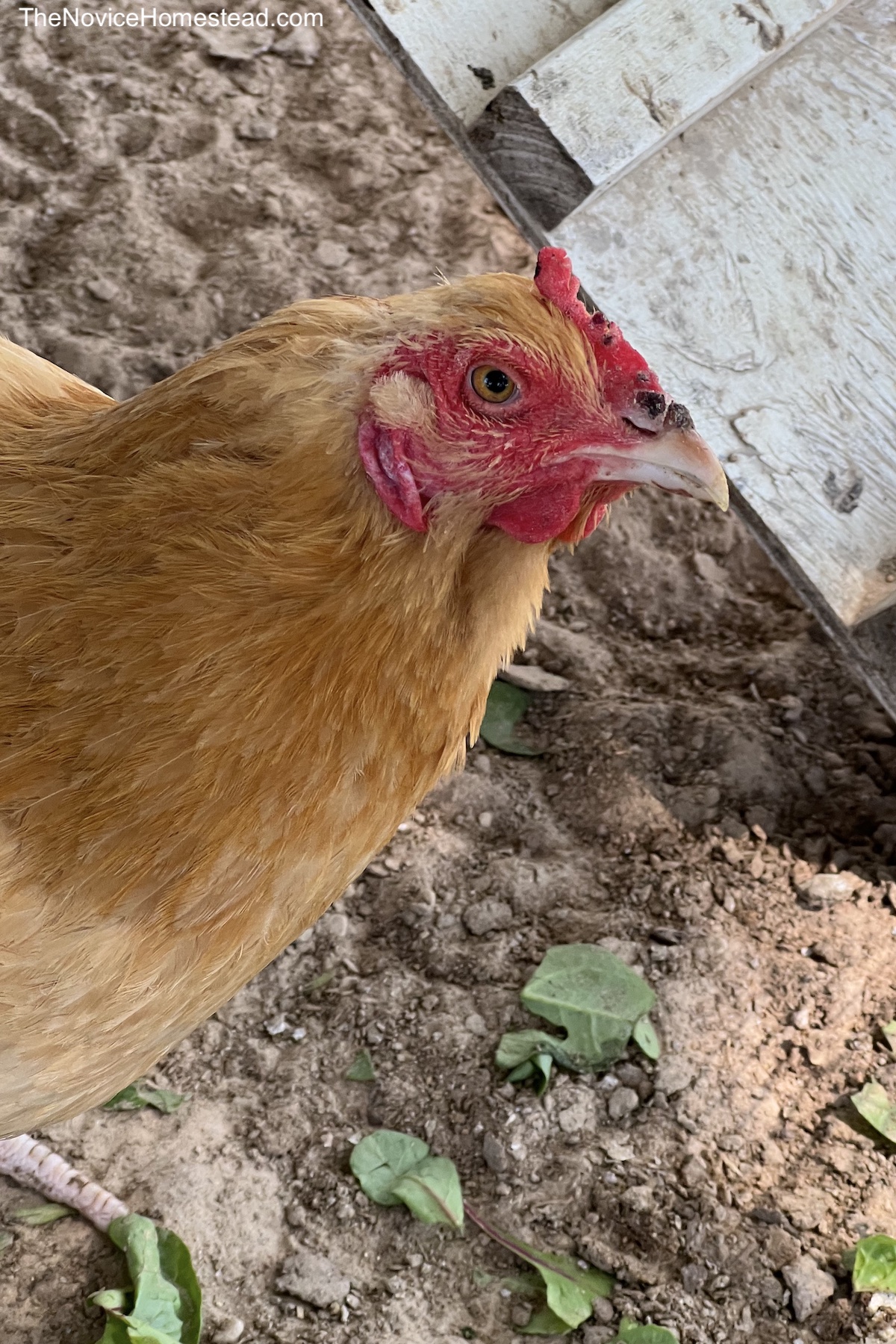Fowl pox is a disease in chickens that is similar to chicken pox in humans. Keep reading to learn more about symptoms of fowl pox and how to prevent it.

Do Chickens Get Chicken Pox?
Despite the name, chicken pox is a human disease. However, chickens DO get a very similar disease, called fowl pox.
What is Fowl Pox?
Fowl pox is a viral disease in birds caused by the avipoxvirus.
The most common, and less severe form of the disease is known as “dry fowl pox.” This condition is easy to spot in chickens due to the telltale sores or lesions on the comb, wattles, and face (especially around the eyes and beak). It is indeed quite similar to chicken pox in humans, which is also characterized by itchy scabs on the body.
There is no cure for fowl pox, so once your chickens have it, the virus simply has to run its course.
A more severe (though usually less common) form of fowl pox is “wet fowl pox.” In addition to the scabs on the outside of the chicken’s head and face, wet fowl pox may also present with lesions inside the mouth or mucus membranes.
Wet fowl pox should be monitored more closely, as it can cause breathing complications, reduced appetite, and increased potential for a secondary infection.

How Do Chickens Catch Fowl Pox?
There are two primary ways in which fowl pox spreads:
- From infected birds (this can include wild birds too)
- Via mosquito bite
Because mosquitos carry the disease from one bird to the next, fowl pox spreads rapidly and can be tough to prevent without vaccination.
If you spot one bird in your flock with fowl pox, it’s likely that the other flock members have been exposed too.
Is Fowl Pox Dangerous?
Fowl pox generally isn’t fatal in otherwise healthy chickens. However, it can be uncomfortable for your chickens and an infection may last for weeks.
Remember when you had chicken pox as a kid? For most of us it wasn’t life-threatening, but it wasn’t a very fun week!
Fowl pox is highly contagious among poultry, but it is not transmissible to humans. But of course, always wear gloves and wash your hands after handling any sick chicken. I also have a pair of “chicken boots” that stay on my back porch and I only use to go in the coop…and NEVER in our house.
How Do You Prevent Fowl Pox?
Note: We’ve included shop-able ad links to products we love and use; read our disclosure policy here.
1. Vaccinate
This is the surest way to prevent your flock from getting fowl pox. Don’t assume that your chicks have been vaccinated (if they come from a store like Tractor Supply, they likely have not been vaccinated).
Do I Need To Vaccinate My Chickens?
This is ultimately a personal decision. Fowl pox is generally not life-threatening in chickens and once they recover, they are immune from future infections.
Different vaccines have different schedules for when they should be administered. Fowl pox vaccines are generally given early in a chicken’s life, by 12-16 weeks of age. But again, each vaccine is different.
If you’ve missed the vaccination window, don’t despair. There are still other ways to keep your flock protected as much as possible.
2. Keep Your Flock Healthy
Healthy chickens are less susceptible to all types of illness. Giving your chickens plenty of space, clean food and water, and a well-maintained coop are the best ways to make sure that their immune system is in fighting shape.
3. Isolate New Chickens
Before you introduce any new birds to your flock, it is important to quarantine these new arrivals for at least 2 weeks. This helps prevent the spread of many diseases, not just fowl pox.
4. Get Rid of Mosquitos
This is easier said than done, but the more efforts you make to control the local mosquito population, the lower the risk of fowl pox from this source. I live in Texas, so I know how tough this can be!
We have seen good results with the Spartan Mosquito Eradicator system. You hang them in the trees around your property and they help control the mosquito population for months. I don’t know if you can ever get rid of ALL mosquitos, but this is the product that has worked the best for us and it doesn’t use any harmful pesticides that might hurt pollinators.
5. Clean Regularly
Chickens are notoriously messy, but cleaning out soiled bedding on a regular basis helps prevent the buildup of bacteria, viruses, and other yucky stuff. Spreading barn lime on the floor of your coop before you add new bedding. Lime is an insect deterrent and prevents bacteria buildup.
TIP: Shop for barn lime on Amazon!
6. Look For Signs Of Illness
I’m out at the coop multiple times throughout the day to feed, water, and check for eggs. However, once a day I crouch down outside the run so all the chickens come running. Then I can give them all a good look over to make sure that everyone appears healthy.

My Chickens Have Fowl Pox…Now What?!
When I first spotted the signs of fowl pox in my flock, I was a little surprised. My chickens do not free range and I hadn’t introduced any new flock members in over a year. How in the world did they get it?!
And then I did some more research and figured out the culprit…mosquitoes…which we have plenty of here in Texas.
Because I saw the signs in more than two of my birds, I figured that they all were exposed and quarantining would be pointless. Aside from the exterior scabs, they did not appear to have any more symptoms of the more serious “wet fowl pox.” They did not appear lethargic or acting “sick.” They were still eating, drinking water, and laying eggs.
Because the symptoms were mild and my birds seemed healthy and energetic otherwise, I tried not to stress out too much and watch them while they healed. And I am happy to report that they all fully recovered in about 2 weeks.
So if your birds DO catch fowl pox, don’t beat yourself up about it. Keep them comfortable, keep their coop clean, and keep a close eye on them while they recover.
Note: If you think that your chickens have wet fowl pox or they act lethargic, stop eating, etc. then you will want to seek a vet’s advice.
Keep in mind, I am not a vet myself, but I wanted to share my experience with this illness to show just how common it is and let you know that it doesn’t make you a “bad” chicken owner if they get it. Fowl pox is extremely contagious, no matter how well protected your flock is, but it is almost always something that chickens will recover from on their own.
More Tips For Raising Backyard Chickens:
- Guide to Raising Baby Chicks
- What is Pasty Butt in Baby Chicks?
- When Do Chickens Start Laying Eggs?
- How Often Do Chickens Lay Eggs
- How Cold is Too Cold for Chickens to be Outside?
- Farm Fresh Eggs 101
- How to Keep Chickens Cool in the Heat
- How to Keep Snakes Out of a Chicken Coop
- What Is Bumblefoot in Chickens?
- How to Keep Chickens From Eating Their Own Eggs
- 8 Myths About Raising Chickens